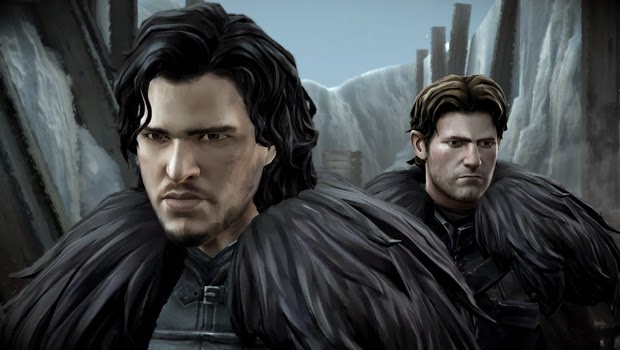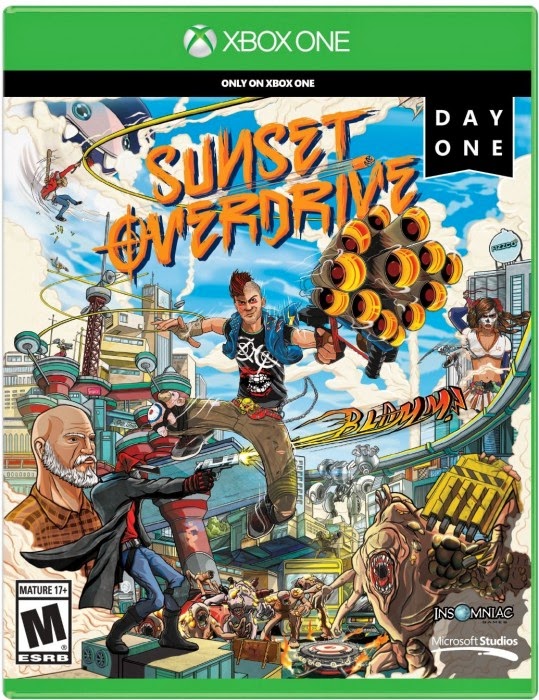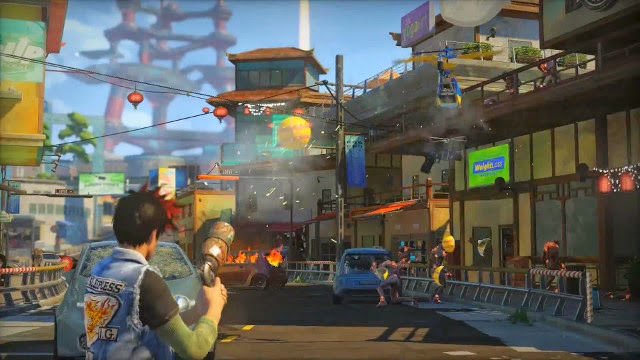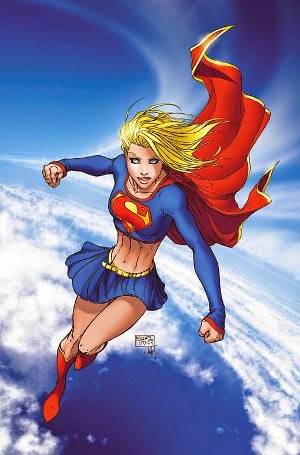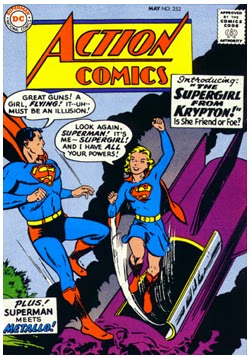The recent announcement of a Supergirl series coming to television was greeted by a lot of fans with a mixture of excitement as well as trepidation. Who would be cast? What would be the plotline? Who would write it? Would they go for a fun or a dark and somber tone? Most of these questions have been answered but one which greeted a lot of fans was: who
is Supergirl?
They have a vague idea who she is or can simply guess by the name, but I thought I'd take time to do an essay for those unfamiliar with the character's history both in as well as out of comics. I have a confession to make. I like Supergirl more than other superheroine on the planet. She is my favorite. Which is great, except for the fact nobody likes Supergirl best. Kara Zor-El occupies a weird position in superheroism along with Batgirl and Wonder Woman in that she's one of the most recognizable superheroines in the world but rarely gets much attention.
This isn't quite the case outside of comics given she's one of the only superheroines in the world to ever get her own movie plus her role in Superman: The Animated Series but from 1985 to 2003, Supergirl as people normally know her was dead.
No, seriously.
The fact she's about to headline her own series on a major network in the upcoming Supergirl series is a major accomplishment for someone who was long considered the redheaded stepchild of DC Comics. A character who was too popular and recognized to keep dead but one they didn't really want anywhere near their main character. This, despite the fact Supergirl had never been unpopular or disliked by the majority of the fandom. Supergirl, instead, has ever been a character which struggled with popularity and fandom from the creators.
![]() |
| I wonder if Clark's mom had black hair or if Jor-El's brother adopted. |
For those not familiar with the character, Supergirl is a character created in Action Comics 252# (1959) by Al Plastino and Otto Binder. This was after a series of previous female incarnations of Superman had been debuted, up to and including one made by a Voodoo doll by Jimmy Olsen.
Comics in the Silver Age were great.
Her origin is a trifle convoluted in order to explain how a teenage girl could be born from a planet which sent Kal-El to a world he grew up on. It involved a Kryptonian city surviving the planet's destruction and floating in space for decades. However, because this would mean the planetary fragment they were on was composed of Kryptonite, they had to lead line the bottom of their city, only for that shielding to fail. So, they sent Kara away from their city as it died.
Meaning Supergirl's home planet blew up twice.
Superman was kind of a jackass back then so his reaction to his cousin from Krypton, which he visited regularly with time travel back then mind you, was to send her to an orphanage. He also ordered her not to use her powers on some vague promise of using her a "secret weapon." Even then, there was the weirdest sense they wanted to keep her character away from the main franchise.
![]() |
| Superman... jerk. |
Superman was already the most famous superhero in the world and internationally famous as well as beloved. While I have no evidence, I can't help but think they were hesitant to rock the boat by introducing a character who had the potential of entirely upending Superman's life given, at the very least, she's a kid sister figure. Because, you know, the natural reaction of the world's greatest hero is to send your only existing blood-relative to live with strangers than your home in Metropolis.
How little regard for the character cam be summarized by DC's vice president/executive editor Dick Giordano, "Supergirl was created initially to take advantage of the high Superman sales and not much thought was put into her creation. She was created essentially as a female Superman. With time, writers and artists improved upon her execution, but she never did really add anything to the Superman mythos—at least not for me."
![]() |
| Brainiac 5 once made a robot version of Supergirl to be his girlfriend. |
|
Supergirl got plenty of interesting stories, don't get me wrong. She got a Kryptonian super-cat, a magical horse who was also a centaur, and also a boyfriend in Brainiac 5. He's the green-skinned alien genius from the 30th century only dimly related to the supervillain of the present era. She also got to use time-travel to team up with her cousin as Superboy in the future.
Comics, everybody.
Then she grew up and everyone forgot she existed. Supergirl, you see, was never quite popular. Well, let me rephrase that, she was never quite as popular as her cousin. Not as popular as Superman is still probably better known than 90% of all fictional character on the planet. Still, she existed in her own corner of the DC universe and was allowed to age through college and go on to become her own distinct person.
Until two major events shook her character forever. The first was the 1984
Supergirl movie starring Helen Slater. Helen Slater looks like a girl who walked off the pages of a comic book and her acting was great but the movie itself was, quite simply, a mess. The story was incoherent as was the world-building but
Supergirl (1984) was somehow still quite entertaining.
![]() |
| This is a great movie for good acting around complete garbage. |
Then they killed off Supergirl.
The 1985
Crisis On Infinite Earths was an attempt to streamline DC comics continuity into something more mainstream and this meant cutting out countless things viewed extraneous. This included, as seen with the publisher upstairs, Supergirl. I always think Superman suffered the most out of the Crisis as he had a rich, weird, science-fiction universe. Cutting all of that out didn't make him a better character. It made him less. Supergirl, at least, got a badass send off, being able to hammer the Anti-Monitor (portrayed as the most dangerous villain ever faced in the history of the DCU) like Rao's own righteous hammer.
![]() |
| An iconic image of comics. |
The thing was, you can't keep a good character down and even then DC had an alternate Supergirl in Powergirl, who was an alternate version of Supergirl allowed to grow up as an adult. Except, they insisted she wasn't Supergirl. Therefore, she had no origin and would go through several ridiculously bad ones culminating in the horrible "mystical pregnancy" plotline which has worked exactly once in the history of storytelling.
Then Supergirl would be replaced by a protoplasmic entity by an alternate dimensional good counterpart of Lex Luthor who assumed the physical form of that reality's Lana Lang, explaining her great beauty. She would become the girlfriend of this reality's evil Lex Luthor who had transplanted his brain into a clone body so he could fake his own death.
After her, said protoplasmic Supergirl (called "Matrix") would merge with a young Satanic cultist (!) named Linda Danvers who would go on to become possessed by the power of an angel. Linda Danvers would be superbly written by Peter David for many issues until a beautiful finale for the character which involved the original Pre-Crisis Kara-Zor El returning for her grand finale.
The Linda Danvers Supergirl, who was liked if never popular, would get replaced by Cir-El who was basically Rachel Summers if Rachel Summer's parents were Lois Lane and Superman.
Everyone hated her and she erased herself from reality. I also recall a fun, briefly in-continuity, crossover between Superman and the
Aliens franchise where Argo City was overrun by xenomorphs. Kara was a badass Ripley-esque fightere there (you can't make this stuff up).
So, lots of Supergirls but none of them the "real" Supergirl.
Or perhaps I should say, none of them were the Supergirl everyone remembered.
Until 1997 and 2003.
![]() |
| Can there be too much of a good thing? Yes. |
Bruce Timm, producer of
Batman: The Animated Series and
Superman: The Animated Series, that mad genius, had the strangest idea that enduring characters like Superman and Batman had an intrinsic appeal to them despite the fact some comic creators wanted to change everything about them.
He brought back Supegirl as a character and, surprisingly enough, had Superman bond with the young woman. Yes, he kept her out of his home in Metropolis but that was because he was trying to protect her from danger as well as get her accustomed to her powers first. She wasn't his cousin but was his surrogate sister, having grown up on a Kryptonian colony world.
And people
liked Kara In-Ze. She was a fun, intelligent, but naive character who fit in fine in Clark Kent's world. I wanted to see more of this Supergirl but, sadly, her role in the setting remained small until the end of the
Justice League series where she decided to live in the future with the Legion of Superheroes.
Supergirl would not return to the comics as Superman's cousin until
Batman/Superman 1# in 2003 when she was returned with a bang instead of a whimper. Reaction to this version of Supergirl was mixed amongst fans. They tried to overplay her sex appeal in order to drum up interest, which was rather creepy given she was a sixteen-year-old girl.
DC attempted to make her a mountain of violent rage and angst with a secret history as daughter of a mad scientist sent to murder Kal-El. Obviously, this is a bit like re-imagining Hello Kitty as a violent nihilistic assassin. Eventually, they got it sorted out by claiming all of her weird memories were a combination of PTSD and Kryptonite poisoning. Then Krypton got resurrected with her parents, only to get blown up again.
![]() |
| Supergirl needs no pants! But sleeves? Yes! |
So, yes, Supergirl has lost her planet THREE times.
Despite this, she became prominent enough to have a recurring role on the
Smallville television series as played by Laura Vanderoot. I can't say much of her depiction but it was a pretty decent-sized role and helped re-solidify the character in the public imagination.
The
New 52 has since rebooted Supergirl once more, this time in her classic self with a new costume. The new Supergirl was raised on Krypton and thus is having a great deal more trouble adapting to Earth than Clark Kent who was raised as an infant. Which only makes sense.
I don't much care for the costume given I'm not sure what sort of costume needs sleeves but no pants but I like this Kara's desire to have her homeland back even if it brings her in conflict with her cousin. It's a nice point of differentiation between them. Kara Zor-El is the Last Kryptonian while Kal-El is a Kryptonian-American.
What is the appeal of the character to me? I'd have to say it's the character's consistent endurance in the face of tragedy. Whether it's Linda Lee Earth Angel, Matrix, or Kara in her various incarnations, she always live truly sucky lives. Loss is never a stranger to her, even more so than Spiderman. Unlike Spiderman, however, she always manages to put on a smile the next day. Well, maybe the next week, but the smile comes back.
So what do I hope from the new series? Honestly, I'm hoping for a series which has faith in the character. Someone who believes that she can be a lead without her cousin's shadow guiding the way. The survivor of a dead world with Superman's powers is a pretty solid concept, especially if she's allowed to also be a teenage girl with all of the angst that entails.

